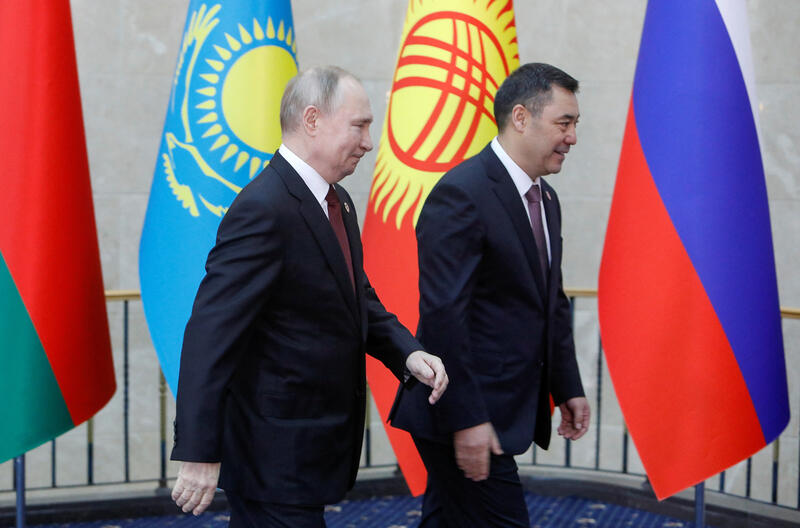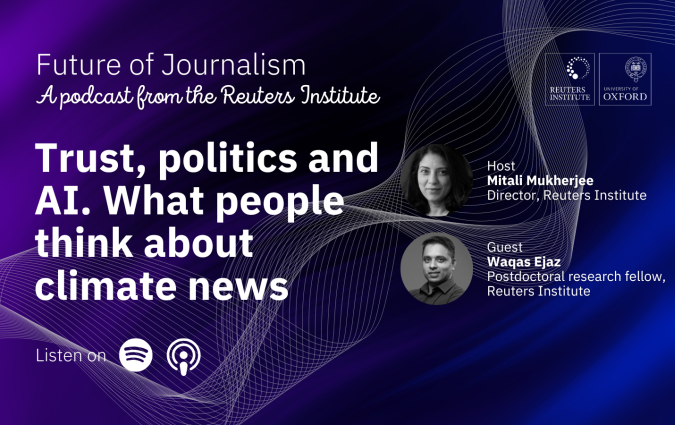Climate journalists need to connect the dots between climate change and the invasion of Ukraine

Kyrgyzstan's President Japarov and Russia's President Putin attend a meeting of the Supreme Eurasian Economic Council in Bishkek in December, 2022. Credit: Vladimir Pirogov/Reuters.
On the 24th of February 2022, I experienced a significant shift in my climate change reporting as an environmental journalist working in Kyrgyzstan.
Russia had invaded Ukraine just a few days before the Intergovernmental Panel on Climate Change's Working Group II report was issued, and when the war started, my outlet, Azattyk Media, decided to change the course of our story and link it to the conflict through the message of phasing out fossil fuels.
Unfortunately, the experts I had previously agreed to quote on the report suddenly became hesitant to comment on the links between climate change, fossil fuels, and the invasion. When I finally published my piece, the only comment related to the impact of the war on climate issues was from Olha Boiko, a climate change activist from Ukraine.
That was just the start. Since then, I have faced numerous obstacles in my reporting, including a lack of climate journalism expertise in the region, the taboo nature of discussing the war in Ukraine, and concerns about the energy and economic dependence of Central Asian countries on Russia.
But although it’s challenging for journalists to truly connect the dots between conflict and climate change, it is crucial to do so. Though the war has woken the world up to its energy dependence on Russia, and the implications for both the climate and geopolitics, Kyrgyzstan is a telling example.
Despite being geographically distant from the battlefield, the ongoing war has highlighted my country’s political and economic dependence on Russia, which many of the other Central Asian countries share.
Of course there are the historic links – Kyrgyzstan is a former Soviet republic. The main instrument for increasing this dependence is the labour migration of Kyrgyz citizens. Around 28 Kyrgyz citizens emigrated every day in 2022, according to the UN; the vast majority go to Russia. This is a dynamic that is common across the region. Money sent home by migrant workers accounts for more than a quarter of the GDP in both Kyrgyzstan and its neighbour Tajikistan.
That dependence is also closely tied to energy, a link that much of the world shares. When the war began, Russia was one of the top three producers of both crude oil and gas in the world; fossil fuel production made up an estimated 45% of its federal budget, according to the International Energy Agency. (Since the invasion, Russia has stopped releasing official energy trade data.)
That economic dominance on fossil fuels has filtered down. Since 2014, Russia has been the largest financial donor to our national economy, and Moscow has used this support as an instrument of influence on Bishkek. Kyrgyzstan imports significant amounts of Russian oil products, while the Russian state energy company Gazprom monopolises its gas sector.
The risks of pointing out this dependence are tangible. As a result, many media outlets, and even independent journalists in the region, tend to remain silent on the war, despite its potential links to climate change and global security.
But as a journalist, it’s my responsibility to draw attention to these critical issues. I have tried to do so during coverage of the COP27 climate conference in Sharm El-Sheikh in 2022, and in daily reporting at Azattyk Media.
But those opportunities are narrowing. Radio Free Europe’s service in Kyrgyzstan has recently been blocked and sued by the Kyrgyz Government. There is also a massive deficit of reporting in local languages. Around 80 million people collectively speak Uzbek, Kazakh, Kyrgyz, Tajik, and Turkmen, but don’t have access to unbiased stories in their national languages because of the ongoing influence of Russian media in their countries.
The war in Ukraine has served as a wake-up call for countries in Central Asia to take greater ownership of their role in the global climate change agenda, without relying on Russian experts or scientists. Before the conflict, we used to organise webinars with Russian experts and stay in touch with policymakers and environmental activists from Russia. However, due to Russia's reduced influence on global climate change policy, Central Asian countries are now focusing on developing their national experts and creating a climate agenda as an independent region.
Alongside climate activists, environmental journalists are trying to fill this gap by organising training for regional media members and bloggers on climate change and ecological literacy. Since October of last year, I have been invited to serve as a senior trainer for over five climate change workshops in Central Asian countries. During these workshops, I shared information with my colleagues about the global climate change agenda, climate change itself, and energy policy, taking into account the ongoing war in Ukraine.
By doing so, we journalists can help create a more comprehensive understanding of the challenges and opportunities facing Central Asia and the world, and drive meaningful action towards a more sustainable and peaceful future.
The region has an opportunity to be more visible in the climate media landscape, and we can encourage other outlets and countries to explore the connections between climate change and conflict.







